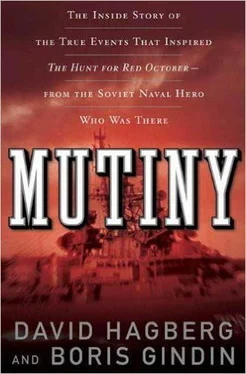“Do you understand your assignment?” he’s asked.
He nods. Of course he understands. But the moment the senior sailor goes away, the kid runs back to his cubrick to find out what he’s supposed to do. By the time he’s finally told exactly what a uterus is and what it does, just about every senior sailor aboard ship is falling on the deck with laughter, while all the other junior sailors are wondering when it’ll be their turn.
Like when one of the senior sailors from Gindin’s section hands one of the new kids a cloth bag.
“Are you aware that there’ll be a major disinfection for medical purposes throughout the entire ship first thing tomorrow morning?” the senior asks.
Of course the muzhik knows nothing about any medical drill, but he nods. After all the sailors aboard ship have gone to bed for the night, the kid is supposed to collect their toothbrushes in the bag and leave it at Dr. Sadakov’s door. The boy does what he’s told. In the morning all the sailors aboard ship get out of their bunks to clean up before exercises, but no one can find his toothbrush. What’s going on? Dr. Sadakov arrives at his dispensary, where he finds a big bag of toothbrushes with no note, and he has to wonder what the hell is going on.
After all is said and done, the young sailor’s boss gives him a very good piece of advice: “Be smarter next time. Try to actually use your brain instead of merely carrying it around.” On the other hand, Russians carry their souls just under their skin. It’s a common heritage, as an old Russian proverb provides: We are all related; the same sun dries our rags.
Mischa Mihailov was one of the typical sailors aboard the Storozhevoy in that he was average in just about everything he did. Gindin recalls that Mischa never showed any passion for his work, though he did have some fairly good basic knowledge of the machinery. If he could get out of a job, he would do it without a moment’s hesitation.
But Mischa could play the guitar and sing Russian songs until there wasn’t a dry eye in his cubrick. Whenever he had time off, usually just before bed, the other sailors would beg him to sing. Especially one particular song that back on base was played all the time on the radio:
Our duty was tough today, carried out
Far from Russia, far from Russia.
Every day we sacrifice our lives
Far from Russia, far from Russia.
The song had been approved by the Kremlin just for sailors like those aboard the Storozhevoy, and whenever it was played everyone, sailors and officers alike, couldn’t help but get a little misty-eyed.
“It was glorifying and praising us for the tough job we did far from home,” Gindin says. “It represented the value and the morality of our Soviet system, and what was important and what deserved to be honored.
“It uplifted our spirits, made us proud of what we did far from our homes and families. It gave us an incredible sense of accomplishment that our people and our government knew and appreciated how difficult our mission was.”
A warship’s mission and the morale of his crew are bound together tighter than anyone who never served in a navy can understand. And both elements come from the top down. Although Potulniy wasn’t as close to his sailors as was Sablin, everyone knew that the captain was a first-class officer who understood the ship and his systems better than anyone else aboard.
Potulniy was in his late thirties when he was assigned to the Storozhevoy, and he was very proud of his position. He spent most of his time either on the bridge or wandering around his ship to make sure that everything was working the way it should be and that his crew was doing their jobs. His personality and style of command was actually a perfect balance between Sablin’s friendliness and Novozilov’s strictness.
Captain Lieutenant Nikolay Novozilov was the Storozhevoy’s executive officer, starpom, and if ever there was a no-nonsense officer it was the exec. He was a perfectionist. Everything needed to be done accurately and on time, with no excuses. There wasn’t an ounce of pity in the man’s body, as Gindin remembers, and he simply didn’t want to hear the circumstances behind any lapse in duty. If Novozilov thought his orders weren’t being carried out to the letter, he’d come down like a ton of bricks on the hapless sailor or officer. Your rank didn’t matter; he was equally tough on everyone aboard.
“He was the kind of officer you never took personal problems to,” Gindin recalls. “He didn’t care. He was beyond that sort of thing. For him the only priority was the ship.”
Heading down the corridor to the midshipmen’s corridor this chilly Riga evening, Gindin is somewhat relieved that at least for the moment they don’t have to worry about Novozilov showing up and finding fault with something his officers had done yesterday or today. Their starpom went home on leave to his wife and kid. His presence aboard isn’t really needed for the short cruise down to the shipyard and the refit. He’ll be back when they get to the base at Baltiysk and will once again put them through the wringer before their next rotation.
Or at least that’s what Gindin and the others believe at this moment in time.
12. THE SHIPBOARD SCHEDULE
The Storozhevoy is a little universe all of its own, connected to Fleet Headquarters only by radio while at sea. The captain is the supreme authority, of course. He has the power of life and death over his crew. His eighteen officers are his standard-bearers, responsible for every detail 24/7. That means if an ordinary sailor makes a mistake, the first person to take the heat will be the officer in charge of his section. And the punishments, especially when Novozilov is involved, will be swift and harsh. More than one Soviet naval officer’s career has been short-circuited because he didn’t pay attention to how his sailors were behaving.
Two schedules are kept aboard ship. The routine daily one that starts with wake-up at six in the morning and ends with bedtime at ten in the evening. Intertwined is the duty schedule in which every sailor and officer works eight hours per twenty-four, is on call for eight hours, and is off for eight hours. That means everybody aboard adheres to both schedules at the same time, which can be grueling.
At 0600 reveille sounds and everyone in bed gets up. The ship’s day has begun, and for the next thirty minutes everyone who can be spared from duty comes up on deck for exercises, no matter the weather. These are push-ups, jogging in place, stretches, and sit-ups. Afterward the men have a half hour to clean up and get dressed for duty.
Showers aboard a Soviet warship are almost as rare as democratic elections. Freshwater is very scarce, so everyone, even officers, is allowed to take a shower only every few weeks, perhaps once a month. It’s just a fact of life aboard that no one questions.
After the first week at sea everyone stinks to high heaven—but it’s everyone, so after a while no one seems to notice. But when you do get to take a shower and change into clean clothes you suddenly realize that everyone else smells really bad.
Since Lieutenant Gindin is in charge of the water makers and water-heating equipment he can be one of the more popular officers aboard.
Breakfast starts at 0700 and can last as long as forty-five or fifty minutes. It’s when everyone gets to talk about the coming duty day or perhaps problems on the overnight shifts or about family and kids and letters from home. And it’s the time to tell jokes—but never about a man’s wife or girlfriend. It is an unwritten rule. Duty at sea is tough enough without worrying about your wife because one of your fellow officers told an off-color joke and put an idea into your head.
Читать дальше












